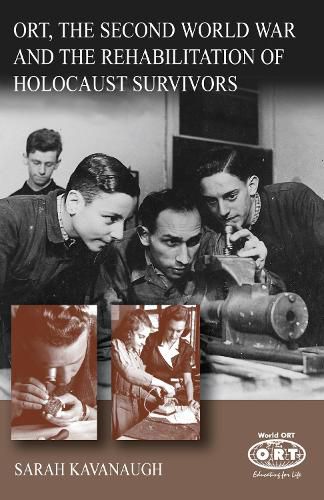Readings Newsletter
Become a Readings Member to make your shopping experience even easier.
Sign in or sign up for free!
You’re not far away from qualifying for FREE standard shipping within Australia
You’ve qualified for FREE standard shipping within Australia
The cart is loading…






For millions of people across Europe, 1945 brought an end to six years of war but not an end to their struggle to survive. For no-one was this more true than the thousands of Jewish refugees who had miraculously evaded Hitler's Holocaust only to find themselves herded into Displaced Persons camps.
For many among this remnant of European Jewry the joy of liberation soon gave way to the bitter realisation that they were alone in the world. The home they had known before the war was no longer theirs and passage out of Europe to a new home was severely restricted. And no matter where they lived they would face the problem of how to earn a living: some had been unable to complete their schooling, others needed new skills to meet the demands of a new age.
There was, however, an organisation that enabled the Survivors to hope again - World ORT. In the condemned communities of the ghettos, ORT had prolonged lives by providing workshops that temporarily exempted trainees from transports east as well as giving them shelter and extra rations. In the DP camps, ORT set about rebuilding lives by preparing Survivors for the future with vocational training and apprenticeships as well as psychological support.
This book explores World ORT's lifesaving work inside the ghettos of Eastern Europe during the Second World War and its role in the DP camps between 1945 and 1948. In presenting what is the first comprehensive study of World ORT's work with Displaced Persons and its contribution to the rehabilitation of Holocaust Survivors, this book also sheds light on an often overlooked part of Holocaust history.
What becomes evident is that whatever the circumstances and wherever it was needed, ORT rose to the challenge and helped imprisoned and demoralised Jewish communities; it transcended differences and divisions by offering help to all Jews, irrespective of political or religious allegiances.
$9.00 standard shipping within Australia
FREE standard shipping within Australia for orders over $100.00
Express & International shipping calculated at checkout
For millions of people across Europe, 1945 brought an end to six years of war but not an end to their struggle to survive. For no-one was this more true than the thousands of Jewish refugees who had miraculously evaded Hitler's Holocaust only to find themselves herded into Displaced Persons camps.
For many among this remnant of European Jewry the joy of liberation soon gave way to the bitter realisation that they were alone in the world. The home they had known before the war was no longer theirs and passage out of Europe to a new home was severely restricted. And no matter where they lived they would face the problem of how to earn a living: some had been unable to complete their schooling, others needed new skills to meet the demands of a new age.
There was, however, an organisation that enabled the Survivors to hope again - World ORT. In the condemned communities of the ghettos, ORT had prolonged lives by providing workshops that temporarily exempted trainees from transports east as well as giving them shelter and extra rations. In the DP camps, ORT set about rebuilding lives by preparing Survivors for the future with vocational training and apprenticeships as well as psychological support.
This book explores World ORT's lifesaving work inside the ghettos of Eastern Europe during the Second World War and its role in the DP camps between 1945 and 1948. In presenting what is the first comprehensive study of World ORT's work with Displaced Persons and its contribution to the rehabilitation of Holocaust Survivors, this book also sheds light on an often overlooked part of Holocaust history.
What becomes evident is that whatever the circumstances and wherever it was needed, ORT rose to the challenge and helped imprisoned and demoralised Jewish communities; it transcended differences and divisions by offering help to all Jews, irrespective of political or religious allegiances.